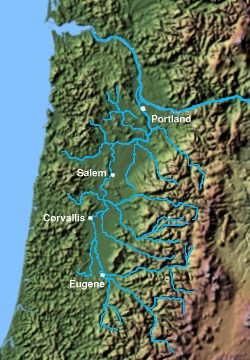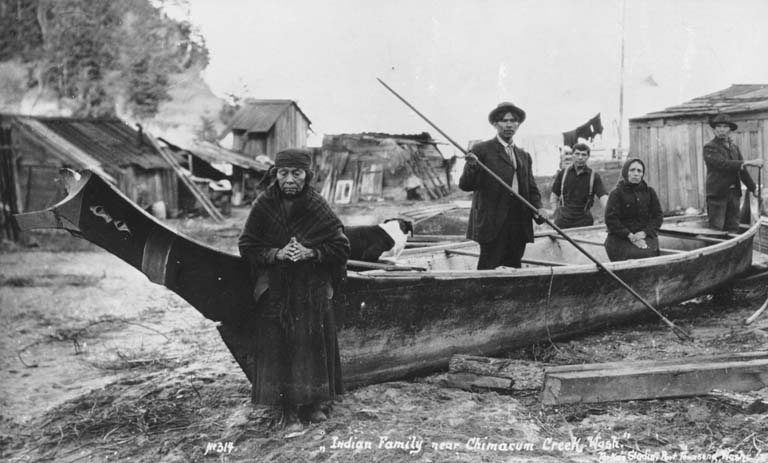|
Joseph Gervais
Joseph Gervais (October 21, 1777 – July 14, 1861) was a French-Canadian, later American, pioneer settler and trapper in the Pacific Northwest. He is the namesake for the town of Gervais, Oregon. Early life Joseph Gervais was born in Maskinongé, Quebec, Canada (British North America at the time) along the St. Lawrence River. Hafen, LeRoy R. ''The Mountain Men and the Fur Trade of the Far West''. Glendale, Calif: A. H. Clark Co, 1965. Vol. VII, p. 131-145.Chapman, J. S. (1993). ''French Prairie Ceramics: The Harriet D. Munnick Archaeological Collection, Circa 1820-1860: A Catalog and Northwest Comparative Guide''. Anthropology Northwest, no. 8. Corvallis, Or: Dept. of Anthropology, Oregon State University. Jean Baptiste Gervais was likely his younger brother. At the age of 20 Joseph left home and spent time employed as a trapper and along the Arkansas River (in what was part of Louisiana) hunting buffalo to be sold in New Orleans. Pacific Fur Company Joseph Gervais joined the ... [...More Info...] [...Related Items...] OR: [Wikipedia] [Google] [Baidu] |
Maskinongé, Quebec
Maskinongé is a municipality in the Mauricie region of the province of Quebec in Canada Canada is a country in North America. Its ten provinces and three territories extend from the Atlantic Ocean to the Pacific Ocean and northward into the Arctic Ocean, covering over , making it the world's second-largest country by tot .... References External links * Incorporated places in Mauricie Municipalities in Quebec Canada geography articles needing translation from French Wikipedia {{Quebec-geo-stub ... [...More Info...] [...Related Items...] OR: [Wikipedia] [Google] [Baidu] |
Willamette Valley
The Willamette Valley ( ) is a long valley in Oregon, in the Pacific Northwest region of the United States. The Willamette River flows the entire length of the valley and is surrounded by mountains on three sides: the Cascade Range to the east, the Oregon Coast Range to the west, and the Calapooya Mountains to the south. The valley is synonymous with the cultural and political heart of Oregon and is home to approximately 70 percent of its population including the five largest cities in the state: Portland, Eugene, Salem, Gresham, and Hillsboro. The valley's numerous waterways, particularly the Willamette River, are vital to the economy of Oregon, as they continuously deposit highly fertile alluvial soils across its broad, flat plain. A massively productive agricultural area, the valley was widely publicized in the 1820s as a "promised land of flowing milk and honey." Throughout the 19th century, it was the destination of choice for the oxen-drawn wagon trains of emigr ... [...More Info...] [...Related Items...] OR: [Wikipedia] [Google] [Baidu] |
Umpqua River
The Umpqua River ( ) on the Pacific coast of Oregon in the United States is approximately long. One of the principal rivers of the Oregon Coast and known for bass and shad, the river drains an expansive network of valleys in the mountains west of the Cascade Range and south of the Willamette Valley, from which it is separated by the Calapooya Mountains. From its source northeast of Roseburg, the Umpqua flows northwest through the Oregon Coast Range and empties into the Pacific at Winchester Bay. The river and its tributaries flow almost entirely within Douglas County, which encompasses most of the watershed of the river from the Cascades to the coast. The "Hundred Valleys of the Umpqua" form the heart of the timber industry of southern Oregon, generally centered on Roseburg. The Native Americans in the Umpqua's watershed consist of several tribes, such as the Lower and Upper Umpqua (for which the river is named), and the Kalapuya. These tribes witnessed much of the Great Flo ... [...More Info...] [...Related Items...] OR: [Wikipedia] [Google] [Baidu] |
Klallam
Klallam (also Clallam, although the spelling with "K" is preferred in all four modern Klallam communities) refers to four related indigenous Native American/First Nations communities from the Pacific Northwest of North America. The Klallam culture is classified ethnographically and linguistically in the Coast Salish subgroup. Two Klallam bands live on the Olympic Peninsula and one on the Kitsap Peninsula in Washington state, and one is based at Becher Bay on southern Vancouver Island in British Columbia. Name variants and usage The indigenous Klallam language name for the tribe is ''nəxʷsƛ̕ay̕əm'' (meaning "strong people"). The word "Klallam" comes from the North Straits Salish language name for the Klallam people, . This has had a wide variety of English spellings including "Chalam", "Clalam", "Clallem", "Clallum", "Khalam", "Klalam", "Noodsdalum", "Nooselalum", "Noostlalum", "Tlalum", "Tlalam", "Wooselalim", "S'Klallam", "Ns'Klallam", "Klallam" and "Clallam". "Clallam" ... [...More Info...] [...Related Items...] OR: [Wikipedia] [Google] [Baidu] |
Washington (U
Washington commonly refers to: * Washington (state), United States * Washington, D.C., the capital of the United States ** A metonym for the federal government of the United States ** Washington metropolitan area, the metropolitan area centered on Washington, D.C. * George Washington (1732–1799), the first president of the United States Washington may also refer to: Places England * Washington, Tyne and Wear, a town in the City of Sunderland metropolitan borough ** Washington Old Hall, ancestral home of the family of George Washington * Washington, West Sussex, a village and civil parish Greenland * Cape Washington, Greenland * Washington Land Philippines *New Washington, Aklan, a municipality *Washington, a barangay in Catarman, Northern Samar *Washington, a barangay in Escalante, Negros Occidental *Washington, a barangay in San Jacinto, Masbate *Washington, a barangay in Surigao City United States * Washington, Wisconsin (other) * Fort Washington (disambiguati ... [...More Info...] [...Related Items...] OR: [Wikipedia] [Google] [Baidu] |
Hood Canal
Hood Canal is a fjord forming the western lobe, and one of the four main basins,Features Of Puget Sound Region: Oceanography And Physical Processes Chapter 3 of th King County Department of Natural Resources, Seattle, Washington, 2001. of in the US state of Washington. It is one ... [...More Info...] [...Related Items...] OR: [Wikipedia] [Google] [Baidu] |
Alexander McKenzie (fur Trader) (born 1973), Canadian ...
Alexander McKenzie may refer to: * Alexander McKenzie (Medal of Honor) (1837–?), US Navy boatswain's mate and Medal of Honor recipient * Alexander McKenzie (politician) (1851–1922), Canadian-born politician in early North Dakota * Alexander McKenzie (chemist) (1869–1951), Scottish chemist * Alexander McKenzie (artist) (born 1971), Australian contemporary artist * Alexander McKenzie (footballer) (1870–1914), Australian rules footballer * Alec McKenzie (1882–1968), Australian rules footballer * Alex McKenzie (1896–1992), New Zealand sharebroker and political party president See also * Alexander Mackenzie (other) * Ali McKenzie (born 1981), English rugby union player * Sandy MacKenzie Sandy MacKenzie (sometimes spelled McKenzie) (born 27 July 1973) is a former ice hockey player. He played three seasons of professional hockey including one in the Eredivisie in the Netherlands. A native of Truro, Nova Scotia, MacKenzie pla ... [...More Info...] [...Related Items...] OR: [Wikipedia] [Google] [Baidu] |
Fort Vancouver
Fort Vancouver was a 19th century fur trading post that was the headquarters of the Hudson's Bay Company's Columbia Department, located in the Pacific Northwest. Named for Captain George Vancouver, the fort was located on the northern bank of the Columbia River in present-day Vancouver, Washington. The fort was a major center of the regional fur trading. Every year trade goods and supplies from London arrived either via ships sailing to the Pacific Ocean or overland from Hudson Bay via the York Factory Express. Supplies and trade goods were exchanged with a plethora of Indigenous cultures for fur pelts. Furs from Fort Vancouver were often shipped to the Chinese port of Guangzhou where they were traded for Chinese manufactured goods for sale in the United Kingdom. At its pinnacle, Fort Vancouver watched over 34 outposts, 24 ports, six ships, and 600 employees. Today, a full-scale replica of the fort, with internal buildings, has been constructed and is open to the public as Fort Van ... [...More Info...] [...Related Items...] OR: [Wikipedia] [Google] [Baidu] |
Hudson's Bay Company
The Hudson's Bay Company (HBC; french: Compagnie de la Baie d'Hudson) is a Canadian retail business group. A fur trading business for much of its existence, HBC now owns and operates retail stores in Canada. The company's namesake business division is Hudson's Bay, commonly referred to as The Bay ( in French). After incorporation by English royal charter in 1670, the company functioned as the ''de facto'' government in parts of North America for nearly 200 years until the HBC sold the land it owned (the entire Hudson Bay drainage basin, known as Rupert's Land) to Canada in 1869 as part of the Deed of Surrender, authorized by the Rupert's Land Act 1868. At its peak, the company controlled the fur trade throughout much of the English- and later British-controlled North America. By the mid-19th century, the company evolved into a mercantile business selling a wide variety of products from furs to fine homeware in a small number of sales shops (as opposed to trading posts) acros ... [...More Info...] [...Related Items...] OR: [Wikipedia] [Google] [Baidu] |
War Of 1812
The War of 1812 (18 June 1812 – 17 February 1815) was fought by the United States of America and its indigenous allies against the United Kingdom and its allies in British North America, with limited participation by Spain in Florida. It began when the United States declared war on 18 June 1812 and, although peace terms were agreed upon in the December 1814 Treaty of Ghent, did not officially end until the peace treaty was ratified by Congress on 17 February 1815. Tensions originated in long-standing differences over territorial expansion in North America and British support for Native American tribes who opposed US colonial settlement in the Northwest Territory. These escalated in 1807 after the Royal Navy began enforcing tighter restrictions on American trade with France and press-ganged men they claimed as British subjects, even those with American citizenship certificates. Opinion in the US was split on how to respond, and although majorities in both the House and ... [...More Info...] [...Related Items...] OR: [Wikipedia] [Google] [Baidu] |
North West Company
The North West Company was a fur trading business headquartered in Montreal from 1779 to 1821. It competed with increasing success against the Hudson's Bay Company in what is present-day Western Canada and Northwestern Ontario. With great wealth at stake, tensions between the companies increased to the point where several minor armed skirmishes broke out, and the two companies were forced by the British government to merge. Before the Company After the French landed in Quebec in 1608, spread out and built a fur trade empire in the St. Lawrence basin. The French competed with the Dutch (from 1614) and English (1664) in New York and the English in Hudson Bay (1670). Unlike the French who travelled into the northern interior and traded with First Nations in their camps and villages, the English made bases at trading posts on Hudson Bay, inviting the indigenous people to trade. After 1731, pushed trade west beyond Lake Winnipeg. After the British conquest of New France in 1763 ... [...More Info...] [...Related Items...] OR: [Wikipedia] [Google] [Baidu] |
Chinookan People
Chinookan peoples include several groups of Indigenous people of the Pacific Northwest in the United States who speak the Chinookan languages. Since at least 4000 BCE Chinookan peoples have resided along the Lower and Middle Columbia River (Wimahl) (″Great River″) from the river's gorge (near the present town of The Dalles, Oregon) downstream (west) to the river's mouth, and along adjacent portions of the coasts, from Tillamook Head of present-day Oregon in the south, north to Willapa Bay in southwest Washington. In 1805 the Lewis and Clark Expedition encountered the Chinook Tribe on the lower Columbia. The term "Chinook" also has a wider meaning in reference to the Chinook Jargon, which is based on Chinookan languages, in part, and so the term "Chinookan" was coined by linguists to distinguish the older language from its offspring, Chinuk Wawa. There are several theories about where the name ″Chinook″ came from. Some say it is a Chehalis word ''Tsinúk'' for the inha ... [...More Info...] [...Related Items...] OR: [Wikipedia] [Google] [Baidu] |




